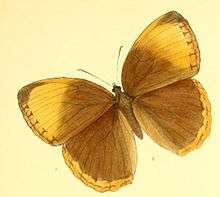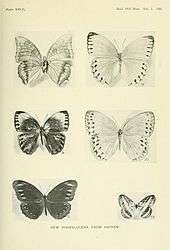Stichophthalma nourmahal
| Chocolate jungle queen | |
|---|---|
 | |
| Scientific classification | |
| Kingdom: | Animalia |
| Phylum: | Arthropoda |
| Class: | Insecta |
| Order: | Lepidoptera |
| Family: | Nymphalidae |
| Genus: | Stichophthalma |
| Species: | S. nourmahal |
| Binomial name | |
| Stichophthalma nourmahal (Westwood, 1851) | |
Stichophthalma nourmahal, the chocolate jungle queen,[1] is a butterfly found in South Asia that belongs to the Morphinae subfamily of the brush-footed butterflies family.
Distribution

The chocolate jungle queen ranges from Sikkim, Assam and Nagaland in India and also in Bhutan.[1][2]
Status
Evans and Haribal report the butterfly as rare over its range.[2][3]
Description
Male upperside bright chocolate brown. Forewing with a very broad, curved, oblique preapical band from costa to termen; apex and the termen narrowly dark brown; a subterminal series of delicate, brown, trident-shaped marks. Hindwing with a band along the terminal margin yellow, bearing paired, lunular, brown marks in the interspaces. Underside dark ochraceous, paler towards the apex of the forewing, with the following transverse markings—subbasal and median dark brown sinuous lines, bordered, the former on the inside, the latter on the outside, by narrow bands of greenish blue; a discal series of obscure ocelli, some of them denned only as pale spots; a postdiscal and a subterminal dark highly-sinuous line, the former ending in a black tornal spot outwardly margined with pink. Antennae, head, thorax and abdomen chocolate brown above, ochraceous beneath.
Female upperside is similar, a preapical white spot on forewing. Underside with the transverse markings similar; the ground colour up to the median black transverse line chocolate-brown; beyond, the forewing from costa to vein 4 light ochraceous, inwardly paling to white below vein 1; the hindwing crossed by a diffuse dark brown band; ocelli as in the male, followed by a dull ochraceous-brown postdiscal area, the terminal margins broadly brown, inwardly defined and crossed subterminally by highly sinuous dark lines. Antennae, head, thorax and abdomen as in the male.[4]
Cited references
- 1 2 "Stichophthalma C. & R. Felder, 1862" at Markku Savela's Lepidoptera and Some Other Life Forms
- 1 2 Evans, W.H. (1932). The Identification of Indian Butterflies (2nd ed.). Mumbai, India: Bombay Natural History Society. pp. 132–133.
- ↑ Haribal, Meena (1992). The Butterflies of Sikkim Himalaya and Their Natural History. Gangtok, Sikkim, India: Sikkim Nature Conservation Foundation. p. 128.
- ↑ Bingham, C.T. (1905). The Fauna of British India, Including Ceylon and Burma Butterflies. 1 (1st ed.). London: Taylor and Francis, Ltd.
| Wikimedia Commons has media related to Stichophthalma nourmahal. |
References
- Wynter-Blyth, Mark Alexander (1957). Butterflies of the Indian Region. Bombay, India: Bombay Natural History Society. ISBN 978-8170192329.